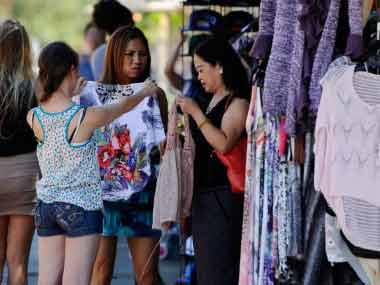Poverty is a life of tough decisions. Pay the rent or pay the vet bills for the family pet? Send your kid to school hungry or risk the social stigma of free meals? Get essential dental work or put up with the pain? These are the sorts of choices you face in
Spent
, an online game that illustrates the kinds of decisions faced by the poor in modern America. Commissioned by the
Urban Ministries of Durham
, which helps people in poverty, it aims to raise awareness of the problems faced by
46 mn Americans currently living below the breadline
. [caption id=“attachment_105214” align=“alignleft” width=“380” caption=“It would be good to see Spent now evolve from a game that communicates the hardship of poverty to one that helps us all take part in solving what is one of the biggest problems facing our world today. AFP”]
 [/caption] The game’s designer, Jenny Nicholson, experienced such hardship as a child.
She told Fast Company
:
[/caption] The game’s designer, Jenny Nicholson, experienced such hardship as a child.
She told Fast Company
:
“I grew up poor, but it’s even hard for me to remember what it’s like,” says Nicholson, a copywriter at the McKinney advertising agency [which built the site], who ultimately worked her way through college. “The frustration, the endless battle were you take one step forward, and two steps back. When we talk about poverty and helping people in poverty, that gets lost. It’s not a matter of making the right decision, or making the smart choice. When you’re in that situation, there is no right choice.”
Since launching in February, the game has been played 1.7 million times in 196 countries , with visitors spending an average of ten minutes on the site as they try to work out how to keep their virtual bank account balanced. And its players aren’t just people with a bit of time to kill. School teachers have been using Spent to help their pupils understand what it is like to be poor in America, something Nicholson said she hadn’t anticipated. Says Technology Review’s Christopher Mims :
Spent isn’t just a game that illustrates the power of the interactive medium to help activists get their message across. In a larger sense, and in a way that perhaps no other medium can match, it illustrates that what games can accomplish is empathy.
But can games do more than just help us empathise with those less fortunate? Jane McGonigal thinks so. Game designer and author of the New York Times bestselling book, Reality is Broken: Why Games Make Us Better and How They Can Change the World , McGonigal focuses on creating games for social good. In 2010, McGonigal created a ten-week online game for the World Bank Institute called EVOKE . More than 19,000 players in over 130 countries undertook real-world missions to tackle major issues such as food security, clean energy and poverty. Wrote McGonigal in the Wall Street Journal earlier this year :
The game focused on building up players’ abilities to design and launch their own social enterprises. After 10 weeks, they had founded more than 50 new companies—real businesses working today from South Africa and India to Buffalo, N.Y. My favorite is Libraries Across Africa, a new franchise system that empowers local entrepreneurs to set up free community libraries. It also creates complementary business opportunities for selling patrons refreshments, WiFi access and cellphone time. The first is currently being tested in Gabon.
With games and game-like systems solving difficult problems such as unraveling the structure of a protein involved in causing AIDs in rhesus monkeys to transcribing ancient papyrus fragments , it’s clear that they are capable of achieving goals that might seem, at the outset, almost impossible. It would be good to see Spent now evolve from a game that communicates the hardship of poverty to one that helps us all take part in solving what is one of the biggest problems facing our world today.
)